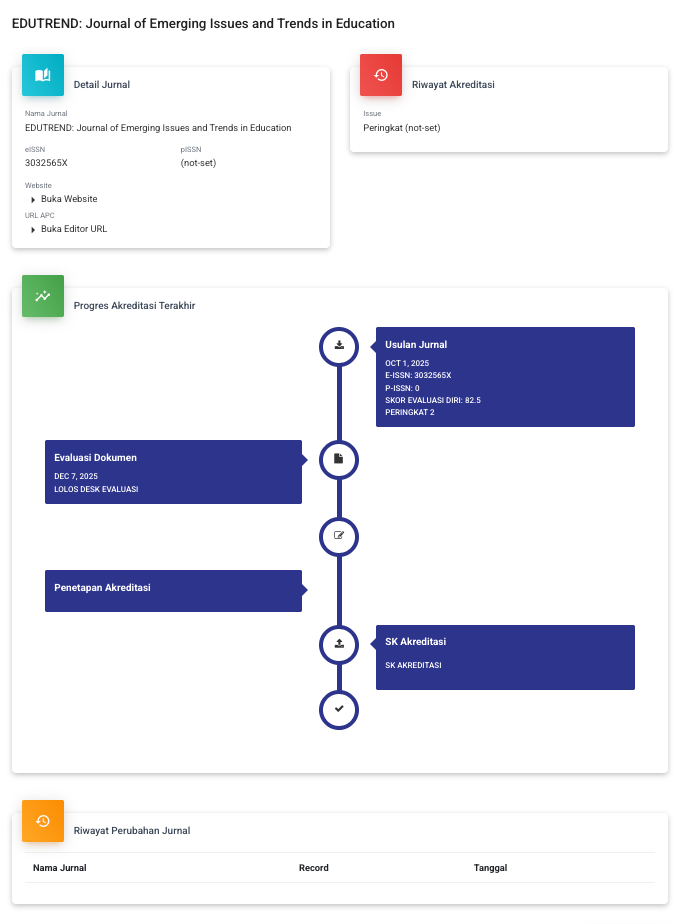Assessing The Efficiency of Web-Hosted E-Learning Platforms in Afghanistan Academic Settings
An Exploration at Herat University
DOI:
https://doi.org/10.59110/edutrend.309Keywords:
Academic effectiveness, E-learning platforms, Herat University, Student engagement, UsabilityAbstract
This study investigates the utilization and effectiveness of web-hosted e-learning platforms within the academic environment of Herat University. Adopting a quantitative research design, data were collected through a structured questionnaire administered to students and faculty members across various disciplines. The sample comprised 190 respondents from the Faculty of Medical, Education, Computer Science, Economics, and Law. Analysis involved descriptive statistics and chi-square tests using SPSS 26 software. Findings revealed diverse platform preferences, with HELMS emerging as the most commonly used platform. Overall, participants expressed high satisfaction levels with platform usability and perceived effectiveness in facilitating student engagement and interaction. Challenges related to cost, internet connectivity, and technical issues were identified, impacting the learning experience. Recommendations include enhancing platform usability through user-friendly interfaces and comprehensive training, as well as addressing technical and connectivity challenges. The study contributes to understanding the current landscape of e-learning at Herat University and provides insights for improving educational practices and policies.
References
Adakawa, M. I., & Musa, A. U. (2021). Adoption and Use of E-learning in Nigerian Higher Institutions for Sustainable Socio-Economic Development. Proceedings of the Ahmadu Bello University Library Complex International Conference.
Afolabi, O. O., & Uhomoibhi, J. (2017). E-learning implementation in higher education: aspects of infrastructure development challenges and students learning approaches. doi:10.13140/RG.2.2.12019.26406
Arapi, P. (2016). Toward Pedagogy-Driven Personalized Learning Experiences in Cultural Digital Libraries. Serdica Journal of Computing, 10(2), 167p-196p. doi:10.13057/ijcs. v10i2.271
Akpojotor, L. O. (2016). Awareness and usage of electronic information resources among postgraduate students of library and information science in Southern Nigeria. Library Philosophy and Practice (e-journal).
Ali, M., Raza, S. A., Qazi, W., & Puah, C. H. (2018). Assessing e-learning system in higher education institutes: Evidence from structural equation modelling. Interactive Technology and Smart Education, 15(1), 59-78.
Bana, D., Eze, M. E., & Esievo, L. O. (2019). A comparative study of the use of electronic resources by LIS and computer science students in two Nigerian universities. Library Hi Tech News, 36(9), 6-10. doi:10.1108/LHTN-04-2019-0027
Daramola, C. F. (2016). Perception and utilization of electronic resources by undergraduate students: The case of the Federal University of Technology Library, Akure. American Journal of Educational Research, 4(5), 366-370.
Dev, K. S. (2019). Constructivist approach to learning based on the concepts of Jean Piaget and lev Vygotsky. The NCERT and No Matter May Be Reproduced in Any Form without the Prior Permission of the NCERT, 44(4), 5–19.
Egielewa, P., Idogho, P. O., Iyalomhe, F. O., & Cirella, G. T. (2022). COVID-19 and digitized education: Analysis of online learning in Nigerian higher education. E-Learning and Digital Media, 19(1), 19–35. doi:10.1177/20427530211022808
Fazil, A. W., Hakimi, M., Shahidzay, A. K., & Hasas, A. (2024). Exploring the Broad Impact of AI Technologies on Student Engagement and Academic Performance in University Settings in Afghanistan. RIGGS: Journal of Artificial Intelligence and Digital Business, 2(2), 56–63. https://doi.org/10.31004/riggs.v2i2.268
Hakimi, M., Fazil, A. W., Khaliqyar, K. Q., Quchi, M. M., & Sajid, S. (2023). Evaluating The Impact of E-Learning on Girl’s Education in Afghanistan: A Case study of Samangan University. International Journal of Multidisciplinary Approach Research and Science, 2(01), 107–120. https://doi.org/10.59653/ijmars.v2i01.368
Hasas, A., Sadaat, S. N., Hakimi, M., & Quchi, M. M. (2024). Interactive Learning in Afghanistan: Feasibility of Implementing IoT Connected Devices in Classrooms. American Journal of Smart Technology and Solutions, 3(1), 8–16. https://doi.org/10.54536/ajsts.v3i1.2342
Hasas, A., Enayat, W., Hakimi, M., & Ahmady, E. (2024). A Comprehensive Review Of ICT Integration In Enhancing Physics Education. MAGNETON: Jurnal Inovasi Pembelajaran Fisika, 2(1), 36-44. https://doi.org/10.30822/magneton.v2i1.3106
Igbo, H. U., Ibegbulam, I. J., Asogwa, B. E., & Imo, N. T. (2022). Provision of digital information resources in Nigerian university libraries. Information Research, 27(3), paper 936. doi:10.47989/irpaper936
Khudai Qul Khaliqyar, Shairagha Katebzadah, & Musawer Hakimi. (2024). A Comprehensive Analysis of the Effectiveness of AI Platforms in Improving Student Educational Skills. International Journal of Integrated Science and Technology, 1(6), 883–898. https://doi.org/10.59890/ijist.v1i6.1103
Linjawi, A. I., & Alfadda, L. S. (2018). Students’ perception, attitudes, and readiness toward online learning in dental education in Saudi Arabia: a cohort study. Advances in Medical Education and Practice, 9(1), 855–863. doi:10.2147/AMEP.S181851
Morgan, G. A., Barrett, K. C., Leech, N. L., & Gloeckner, G. W. (2019). IBM SPSS for introductory statistics: Use and interpretation. Routledge.
Niqresh, M. (2019). Digital Library and Intellectual Issues--Issues in Copyright and Intellectual Property. International Education Studies, 12(1), 114-127. doi:10.5539/ies.v12n1p114
Okiki, O. C., & Ireko, B. Z. (2022). Awareness and use of digital educational databases by final year students in selected private universities in southwest Nigeria. Nigerian Online Journal of Educational Sciences and Technology, 4(1), 131-142. doi:10.22158/nojest.v4n1p131
Popoola, S. O., & Adedokun, O. O. (2023). Computer self-efficacy, computer anxiety, cognitive skills, and use of electronic library resources by social science undergraduates in a tertiary university in Nigeria. Journal of Librarianship and Information Science, 55(1), 111-122. doi:10.1177/09610006211041191
Quadri, G. O., Adetimirin, A. E., & Idowu, O. A. (2014). A study of availability and utilization of library electronic resources by undergraduate students in private universities in Ogun State, Nigeria. International Journal of Library and information science, 6(3), 28-34. doi:10.5897/IJLIS2013.0421
Stolyarov, Y. N. (2021). Digital library studies: The subject and definition. Scientific and Technical Libraries, 7(1), 14-32. doi:10.31918/2310-8870-2021-7-1-14-32
Tsybulsky, D. (2020). Digital curation for promoting personalized learning: A study of secondary-school science students’ learning experiences. Journal of Research on Technology in Education, 52(3), 429-440. doi:10.1080/15391523.2020.1752780
Yebowaah, F. A., & Plockey, F. D. D. (2018). Awareness and use of electronic resources in university libraries: A case study of University for Development Studies Library. Library Philosophy and Practice, 1562. doi:10.13140/RG.2.2.34941.33769
Downloads
Published
How to Cite
Issue
Section
License
Copyright (c) 2024 Frishta Amiri, Tamanna Quraish, Musawer Hakimi, Abdul Wajid Fazil

This work is licensed under a Creative Commons Attribution-ShareAlike 4.0 International License.
















 the Creative Commons Attribution-ShareAlike 4.0 International License |
the Creative Commons Attribution-ShareAlike 4.0 International License | 